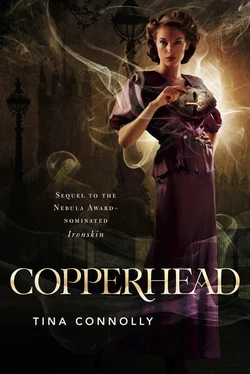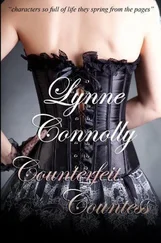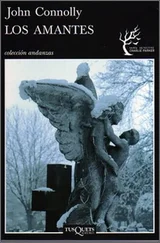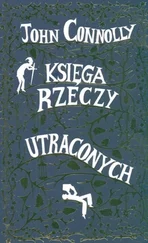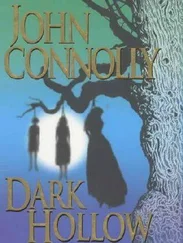Copperhead
Ironskin - 2
by
Tina Connolly
For the grandparents—
especially my grandmother
Chapter 1
A HOUSE OF HYDRA
The door was grey, ash and soot and smog grey, the grey of a city choked on its own failure. The full iron mask, padded though it was, was ice-cold in the frigid November night. Helen slipped one lilac-gloved finger under the chin of the mask and angled it so she could better see out of the eyeholes. Yes. Even here at the Grimsbys’, the stoop and sidewalk and bushes were blanketed with misty shreds of blue.
The fey.
Bits of the fey.
With one hand Helen found her sister Jane, standing just behind her. With the other she reached for the copper doorknocker, then stopped as her fingers closed on the rapping bit—the coiled tail of a seven-headed copperhead hydra. The emblem of the Copperhead Society was spreading faster and faster these days, almost as fast as the blue bits of fey that lay quiescent throughout the city.
But Mr. Grimsby was the leader of Copperhead. It was his house, his meeting. And her husband, Alistair, would want to take the lead.
Helen’s fingers fell away and she stood there in the frosty air, ice crystals on her breath and Jane’s cold fingers squeezed in the grip of her gloved hand. Two patient women. Protected. Waiting. Helen turned to Jane and with frost in her breath mouthed, “Soon.”
Jane nodded. Unlike Helen, her face was bare—and yet not, for she had thin iron strips embedded in her skin that outlined her perfect, inhuman features. The strips ringed her eyes, followed the curve of her cheekbone, ran along her jawline—an eerie but not ugly effect, especially when contrasted with the perfection of her face. Those iron strips, Helen’s iron mask—all to protect the two women from the deadly fey. Jane’s green eyes glittered in the cold and Helen suddenly thought of all she could do, would do, to help the vulnerable women like herself, to help Jane. Helen would redeem herself yet.
“Hurry, hurry, girls,” said a refined voice behind them. Alistair Huntingdon squeezed between the two sisters to bang imperiously on the doorknocker. “This is the most dangerous part of the trip, Helen. You must hurry inside.”
I have my iron mask on, Helen thought rebelliously, but all she said was, “Of course, darling.”
Alistair pointed one yellow-gloved finger at a patch of blue coiled on the front lawn, a handsbreadth from the iron railing that would be poison to it. “I say, is that one moving? I swear I saw it move.”
Helen’s nerves twitched as he pointed, but she willed herself to stay calm. The blue bits of fey coated the city these days, covered everything not iron. She had even seen a motorcar with blue mist clinging to its rubber tires. But the bits of fey were mostly silent, mostly still.
Mostly.
Luckily the door was opened then by a man who looked more brawn than butler, who muttered through the ritual “An’ ye be human, enter,” and then with a hefty white-gloved hand brought them forcefully over the iron threshold and inside.
The air was warm. It would be close before the night was out, Helen thought, stuck in that room full of hot tempers and single-minded men. Or was it that her nerves were busy jangling, now that they were here, now that she needed to convince Jane of what they were to do tonight … and under whose noses?
A homely maid took their wraps. With relief, Helen reached to unbuckle her iron mask, but her husband stopped her. “Could be dangerous.”
“Security seems tight enough,” said Helen. “Besides, do you really think this house—of all houses—isn’t fully iron-barred at each door, every window? The fey can’t cross that without invitation. Jane and I will be safe.”
“I would trust Grimsby with my life,” said Alistair immediately.
“Good,” said Helen, reaching again for the buckles.
“But not yours. Consider, my pet. Remember that a fey almost took you over before. No, I’m not risking that again.”
“Seems like if you paid for this face you ought to let people see it,” said Helen, or rather, she didn’t say it as she knew it would be just one teensy remark too far. No point in letting her wretched tongue ruin all of her evening’s plans over the urge to get a dig in, especially when his face was already going white around the nostrils. She pulled back into delightful, chattering Helen, and said, “I understand you’re looking out for me, Alistair dear! Very sensible of you and of course I shall obey. It did occur to me though—one teensy little thought—if I were to go unmasked, then I would be the most beautiful woman in the room. All the other women with fey faces like mine will be too afraid to go unmasked. But I could be so charming that I win everyone over—to your cause, of course. For your goals.”
A covetous spark leapt to Alistair’s eye. “Perhaps there is merit in what you say. As you say, Grimsby’s house is surely the safest in town. He hates the blue scum even more than I do, if possible.”
“Excellent,” said Helen, and unbuckled her mask and handed it to the homely maid before her husband could rescind his permission. “Now, Jane, if you’re finished, let’s go to the powder room and smooth our hair after those mussing buckles, shall we?” She flashed her brilliant smile around the room.
Helen took Jane’s arm and whisked them away into a small powder room. Helen had been to the Grimsbys’ once before, in the short halcyon time between marrying Alistair Huntingdon seven months ago but before the blue fey appeared in the city, and Copperhead rose up along with it. Well, those days hadn’t been entirely perfect, but they seemed so now. This house had been hung with tiny yellow lights—the new electricity coming into vogue. Before the Great War, relations had been amicable, if distant, with the rarely seen fey, and a steady trade of fey technology had kept humans supplied with clean energy—“bluepacks” that ran all the lights and cars and trolleys. But eight years ago the fey attacked. The Great War started between the two races, and trade stopped, leaving humans bereft of all their borrowed technology. Humans had struggled to pull society back from collapse, while fighting the forest-dwelling fey—an enemy of blue mist that could emulate humans—or worse, animate their dead bodies. The war dragged on for nearly four years, then abruptly the fey disappeared. Slowly people dared hope they were gone for good—slowly hope and laughter and silk stockings returned to the city. That dance seven months ago had been lovely and perfect, one of those few evenings when Helen had felt as though she fit in with her new, rarefied society. She had worn a slinky green velvet dress and coppery T-strap shoes, her red-gold hair all over curls. And she had been pretty. Plain pretty, not inhumanly perfect …
Helen came back to reality with a sigh and turned away from the mirror. “Now, Jane,” she said. “Tell me who you need to meet tonight. The most important candidate is Millicent Grimsby, but so many women of The Hundred will be here with their husbands. You should be able to meet a fair number of them.” Her tongue beat with the urge to say what Jane needed to do with Millicent, but she held it. Millicent’s safety was riding on her. She could not tip their hand too soon, even to Jane. The less Jane knew till the last second, the less she could give away in a glance, a look, a misplaced word at the end of a sentence. Oh, when she thought of that horrible Mr. Grimsby … Helen told her racing heartbeat to still, but her heart never obeyed her.
Jane looked at her sister from under level black brows. “Does he always order you around like that?”
Читать дальше
